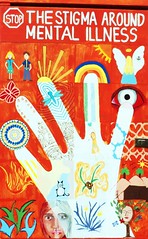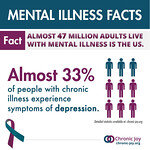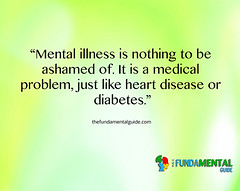Mental Illness Stigmatized
The world is filled with many misconceptions of individuals with mental illnesses. The media, health care settings and even in movies, they all portray individuals with mental illness with misunderstandings and biases. They do this to make sense of things that they do not understand, have full knowledge about and use this to cope with fear of the unknown.

Most Common Mental Illnesses that Face Stigma
The World Health Organization (WHO) identified barriers to mental health care that place these individuals with mental illness at greatest risk. The mental illnesses include:
· Schizophrenia
· Bi-polar
· Anxiety and Depression
· Obsessive Compulsive Disorders
· Anorexia
Barriers of Mental Health
· Stigma
· Lack of awareness
· Lack of mental health care (shortage of mental health staff, access to appointments, and long wait times)
· Financial
· Lack of trust with the healthcare system
Promoting Awareness
News & Social media- Educate with correct knowledge and understanding before Broadcasting
Behaviors of others- Chose correct language (not the words crazy, nuts, cuck coo, or whack job), and be compassionate
Support- Educate family, friends and neighbors with accurate mental health signs and symptoms
Theatre- Contact-based interventions (Individuals expressing their stories living with mental illness)
Campaigns – Marketing anti-discrimination and anti-stigma (speak out)
https://www.youtube.com/watch?v=gQ9QA7Bh55o
Mental health Myths Vs. Facts:
Myth: Many people believe information on Social Media News is accurate. A posting on YouTube featuring a mass shooting in Florida in 2018, by a man with a past history of mental illness, our U.S. House of Representatives Speaker, Paul Ryan, stated “Mental Health is often a big problem underlying these tragedies”.
Fact: According to a transcript by Psychiatrist, Dr. Eric Bender, he stated, “Not everyone with a Mental Illness becomes violent”. Dr. Eric Bender’s transcript was on mental health scenes from movies and TV.
Myth: Many individuals with mental illness do not want to seek help.
Fact: An article titled, Mental Illness, help seeking, and public health programs, many individuals with mental ill avoid treatment. The avoidance is likely due to lack of knowledge to identify mental illness, not knowing how to access treatment, insufficient mental illness health care and prejudice, discrimination and stigma placed on individuals with mental illness.
Myth: Health care professionals and medical students facilitate medical care equally to individuals across the healthcare spectrum.
Fact: Due to the lack of mental health education in the school curriculum, individuals with mental illness often are stigmatized by health care professionals and medical students. According to the CDC one out of every 25 Americans live with a serious mental illness.

Negative Effects of Mental Health Stigmatism
The effects of misinformation on individuals with mental illnesses makes it extremely difficult for these individuals to want to seek help. For those individuals who do not seek mental health treatment have a reduction in life expectancy by
15-20 years.
Conclusion
Despite efforts to raise awareness, mental illness stigma remains high. The beliefs are these individuals have tendencies to become violent which leads to fear. The inaccuracy and lack of mental health information affects many individual attitudes in all aspects of society including the healthcare industry towards these individuals with mentally illness. It causes stereotyping, stigma and discrimination. Millions of individuals with mental illness deserve safe and non-judgement environments. Many of us depend on media technology for information. The goal should be to eliminate barriers so those with mental illness can receive mental health services and live a life worth living.
References:
Conklin, T. M. (2021). Mental illness stigma: Strategies to address a barrier to care. Women’s Healthcare: A Clinical Journal for NPs, 9(2), 16–20. https://doi-org.ezproxy.neit.edu/10.51256/whc042116
Henderson, C., Evans-Lacko, S., & Thornicroft, G. (2013). Mental Illness Stigma, Help Seeking, and Public Health Programs. American Journal of Public Health, 103(5), 777–780. https://doi-org.ezproxy.neit.edu/10.2102/AJPH.2012.301056
Kosyluk, K., Marshall, J., Conner, K., Macias, D. R., Macias, S., Michelle Beekman, B., & Her, J. (2021). Challenging the Stigma of Mental Illness Through Creative Storytelling: A Randomized Controlled Trial of This Is My Brave. Community Mental Health Journal, 57(1), 144–152. https://doi-org.ezproxy.neit.edu/10.1007/s10597-020-00625-4
Riffel, T., & Chen, S.-P. (2020). Stigma in Healthcare? Exploring the Knowledge, Attitudes, and Behavioural Responses of Healthcare Professionals and Students toward Individuals with Mental Illnesses. Psychiatric Quarterly, 91(4), 1103–1119. https://doi-org.ezproxy.neit.edu/10.1007/s11126-020-09809-3
YouTube. (2021, February 16). Psychiatrist breaks down mental health scenes from Movies & TV | GQ. YouTube. Retrieved February 2, 2023, from https://www.youtube.com/watch?v=Sbp_EeBk-As
